Kia Ceed vs SsangYong Korando - Differences and prices compared
Compare performance (140 HP vs 190 HP), boot space and price (23500 £ vs 27000 £) at a glance. Find out which car is the better choice for you – Kia Ceed or SsangYong Korando?
Costs and Efficiency:
When it comes to price and running costs, the biggest differences usually appear. This is often where you see which car fits your budget better in the long run.
Kia Ceed has a somewhat advantage in terms of price – it starts at 23500 £, while the SsangYong Korando costs 27000 £. That’s a price difference of around 3514 £.
Fuel consumption also shows a difference: Kia Ceed manages with 6 L and is therefore noticeable more efficient than the SsangYong Korando with 7.50 L. The difference is about 1.50 L per 100 km.
Engine and Performance:
Power, torque and acceleration say a lot about how a car feels on the road. This is where you see which model delivers more driving dynamics.
When it comes to engine power, the SsangYong Korando has a noticeable edge – offering 190 HP compared to 140 HP. That’s roughly 50 HP more horsepower.
In acceleration from 0 to 100 km/h, the SsangYong Korando is to a small extent quicker – completing the sprint in 8.40 s, while the Kia Ceed takes 9.50 s. That’s about 1.10 s faster.
In terms of top speed, the Kia Ceed performs minimal better – reaching 197 km/h, while the SsangYong Korando tops out at 191 km/h. The difference is around 6 km/h.
There’s also a difference in torque: SsangYong Korando pulls distinct stronger with 360 Nm compared to 253 Nm. That’s about 107 Nm difference.
Space and Everyday Use:
Beyond pure performance, interior space and usability matter most in daily life. This is where you see which car is more practical and versatile.
Both vehicles offer seating for 5 people.
In curb weight, Kia Ceed is a bit lighter – 1298 kg compared to 1517 kg. The difference is around 219 kg.
In terms of boot space, the SsangYong Korando offers distinct more room – 551 L compared to 395 L. That’s a difference of about 156 L.
In maximum load capacity, the Kia Ceed performs minimal better – up to 1291 L, which is about 43 L more than the SsangYong Korando.
When it comes to payload, Kia Ceed minimal takes the win – 490 kg compared to 463 kg. That’s a difference of about 27 kg.
Who comes out on top?
Overall, the SsangYong Korando shows itself to be is largely superior and secures the title of DriveDuel Champion.
It convinces with the more balanced overall package and proves to be the more versatile choice for everyday use.
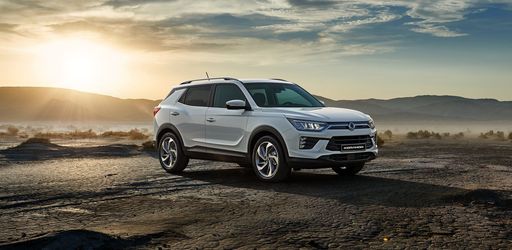
SsangYong Korando
Costs and Consumption
View detailed analysis
Engine and Performance
View detailed analysis
Dimensions and Body
View detailed analysis
Kia Ceed
The Kia Ceed is a sensible, stylish hatchback that gives buyers more than they'd expect for the money, blending practical space with crisp, modern looks. It drives with measured confidence and comes loaded with user-friendly kit, so you can enjoy daily life behind the wheel without breaking into a sweat.
details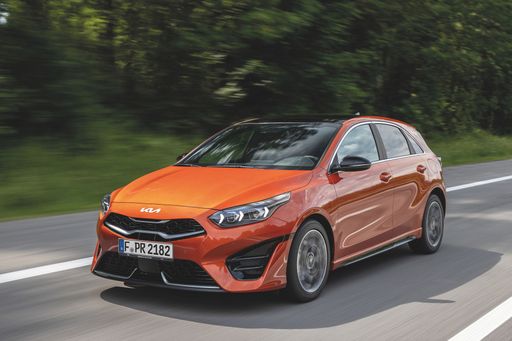
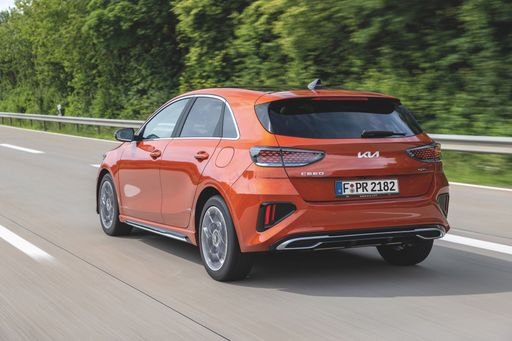
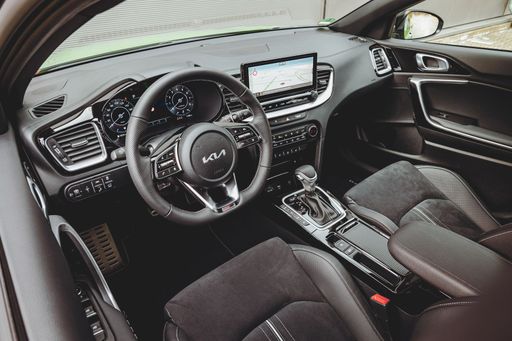
SsangYong Korando
The SsangYong Korando pairs bold, modern styling with a surprisingly roomy and practical cabin, so it looks confident at the lights and handles the daily grind without fuss. It swaps flashy badges for honest value, offering a composed ride, useful equipment and wallet-friendly running that make it an appealing pick for buyers who'd rather spend on weekends than on extravagant finance packages.
details
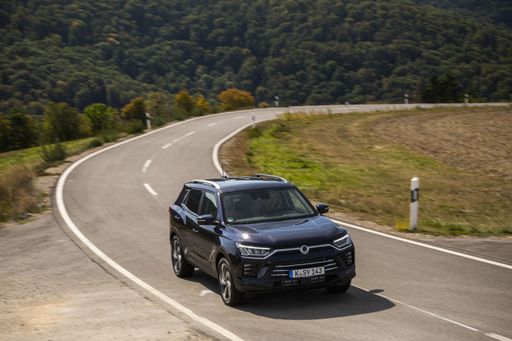
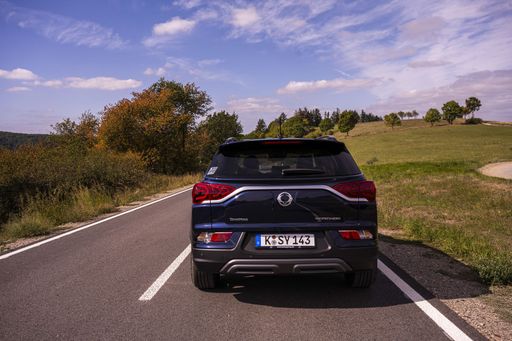
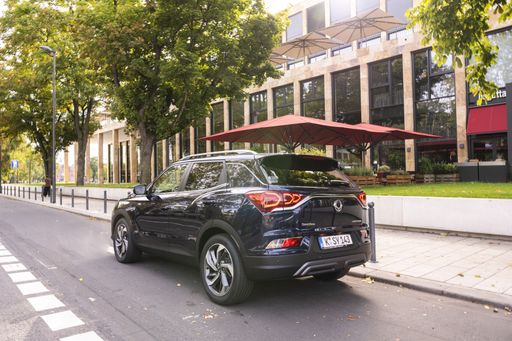
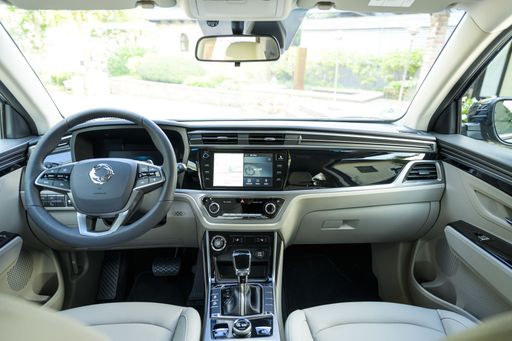

|

|
|
|
|
Costs and Consumption |
|
|---|---|
|
Price
23500 - 26300 £
|
Price
27000 - 42000 £
|
|
Consumption L/100km
6 - 6.4 L
|
Consumption L/100km
7.5 - 8.6 L
|
|
Consumption kWh/100km
-
|
Consumption kWh/100km
16.80 kWh
|
|
Electric Range
-
|
Electric Range
339 km
|
|
Battery Capacity
-
|
Battery Capacity
-
|
|
co2
137 - 146 g/km
|
co2
0 - 197 g/km
|
|
Fuel tank capacity
50 L
|
Fuel tank capacity
50 L
|
Dimensions and Body |
|
|---|---|
|
Body Type
Hatchback
|
Body Type
SUV
|
|
Seats
5
|
Seats
5
|
|
Doors
5
|
Doors
5
|
|
Curb weight
1298 - 1372 kg
|
Curb weight
1517 - 1840 kg
|
|
Trunk capacity
357 - 395 L
|
Trunk capacity
551 L
|
|
Length
4315 mm
|
Length
4450 - 4465 mm
|
|
Width
1800 mm
|
Width
1870 mm
|
|
Height
1447 mm
|
Height
1620 - 1645 mm
|
|
Max trunk capacity
1253 - 1291 L
|
Max trunk capacity
1248 L
|
|
Payload
478 - 490 kg
|
Payload
410 - 463 kg
|
Engine and Performance |
|
|---|---|
|
Engine Type
Petrol, Petrol MHEV
|
Engine Type
Petrol, Electric
|
|
Transmission
Manuel, Automatic
|
Transmission
Manuel, Automatic
|
|
Transmission Detail
Manual Gearbox, Dual-Clutch Automatic
|
Transmission Detail
Manual Gearbox, Automatic Gearbox, Reduction Gearbox
|
|
Drive Type
Front-Wheel Drive
|
Drive Type
Front-Wheel Drive, All-Wheel Drive
|
|
Power HP
100 - 140 HP
|
Power HP
163 - 190 HP
|
|
Acceleration 0-100km/h
9.5 - 13.2 s
|
Acceleration 0-100km/h
8.40 s
|
|
Max Speed
178 - 197 km/h
|
Max Speed
156 - 191 km/h
|
|
Torque
172 - 253 Nm
|
Torque
260 - 360 Nm
|
|
Number of Cylinders
3 - 4
|
Number of Cylinders
4
|
|
Power kW
74 - 103 kW
|
Power kW
120 - 140 kW
|
|
Engine capacity
998 - 1482 cm3
|
Engine capacity
1497 cm3
|
General |
|
|---|---|
|
Model Year
2024
|
Model Year
2021 - 2023
|
|
CO2 Efficiency Class
E
|
CO2 Efficiency Class
F, G, A
|
|
Brand
Kia
|
Brand
SsangYong
|
What drivetrain options does the Kia Ceed have?
The Kia Ceed is available as Front-Wheel Drive.
The prices and data displayed are estimates based on German list prices and may vary by country. This information is not legally binding.
